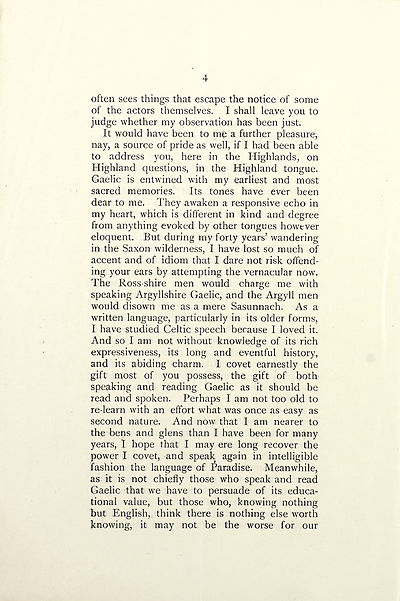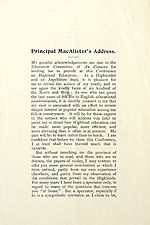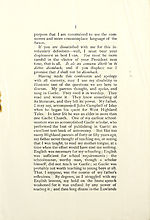Download files
Complete book:
Individual page:
Thumbnail gallery: Grid view | List view

4
often sees things that escape the notice of some
of the actors themselves. I shall leave you to
judge whether my observation has been just.
It would have been to m’£ a further pleasure,,
nay, a source of pride as we|l, if I had been able
to address you, here in the Highlands, on
Highland questions, in the Highland tongue.
Gaelic is entwined with my earliest and most
sacred memories. Its tones have ever been
dear to me. They awaken a responsive echo in
my heart, which is different in kind and degree
from anything evoked by other tongues however
eloquent. But during my forty years’ wandering
in the Saxon wilderness, I have lost so much of
accent and of idiom that I dare not risk offend¬
ing your ears by attempting the vernacular now.
The Ross-shire men would charge me with
speaking Argyllshire Gaelic, and the Argyll men
would disown me as a mere Sasunnach. As a
written language, particularly in its older forms,
I have studied Celtic speech because I loved it.
And so I am not without knowledge of its rich
expressiveness, its long and eventful history,
and its abiding charm. I covet earnestly the
gift most of you possess, the gift of both
speaking and reading Gaelic as it should be
read and spoken. Perhaps I am not too old to
re-learn with an effort what was once as easy as
second nature. And now that 1 am nearer to
the bens and glens than I have been for many
years, I hope that I may ere long recover the
power I covet, and speak again in intelligible
fashion the language of Paradise. Meanwhile,
as it is not chiefly those who speak and read
Gaelic that we have to persuade of its educa¬
tional value, but those who, knowing nothing
but English,, think there is nothing else worth
knowing, it may not be the worse for our
often sees things that escape the notice of some
of the actors themselves. I shall leave you to
judge whether my observation has been just.
It would have been to m’£ a further pleasure,,
nay, a source of pride as we|l, if I had been able
to address you, here in the Highlands, on
Highland questions, in the Highland tongue.
Gaelic is entwined with my earliest and most
sacred memories. Its tones have ever been
dear to me. They awaken a responsive echo in
my heart, which is different in kind and degree
from anything evoked by other tongues however
eloquent. But during my forty years’ wandering
in the Saxon wilderness, I have lost so much of
accent and of idiom that I dare not risk offend¬
ing your ears by attempting the vernacular now.
The Ross-shire men would charge me with
speaking Argyllshire Gaelic, and the Argyll men
would disown me as a mere Sasunnach. As a
written language, particularly in its older forms,
I have studied Celtic speech because I loved it.
And so I am not without knowledge of its rich
expressiveness, its long and eventful history,
and its abiding charm. I covet earnestly the
gift most of you possess, the gift of both
speaking and reading Gaelic as it should be
read and spoken. Perhaps I am not too old to
re-learn with an effort what was once as easy as
second nature. And now that 1 am nearer to
the bens and glens than I have been for many
years, I hope that I may ere long recover the
power I covet, and speak again in intelligible
fashion the language of Paradise. Meanwhile,
as it is not chiefly those who speak and read
Gaelic that we have to persuade of its educa¬
tional value, but those who, knowing nothing
but English,, think there is nothing else worth
knowing, it may not be the worse for our
Set display mode to:
![]() Universal Viewer |
Universal Viewer | ![]() Mirador |
Large image | Transcription
Mirador |
Large image | Transcription
| An Comunn Gàidhealach > An Comunn Gàidhealach Publications > Gaelic in the Highland schools > (4) |
|---|
| Permanent URL | https://digital.nls.uk/122769619 |
|---|
| Description | This contains items published by An Comunn, which are not specifically Mòd-related. It includes journals, annual reports and corporate documents, policy statements, educational resources and published plays and literature. It is arranged alphabetically by title. |
|---|
| Description | A collection of over 400 items published by An Comunn Gàidhealach, the organisation which promotes Gaelic language and culture and organises the Royal National Mòd. Dating from 1891 up to the present day, the collection includes journals and newspapers, annual reports, educational materials, national Mòd programmes, published Mòd literature and music. |
|---|---|
| Additional NLS resources: |
|

